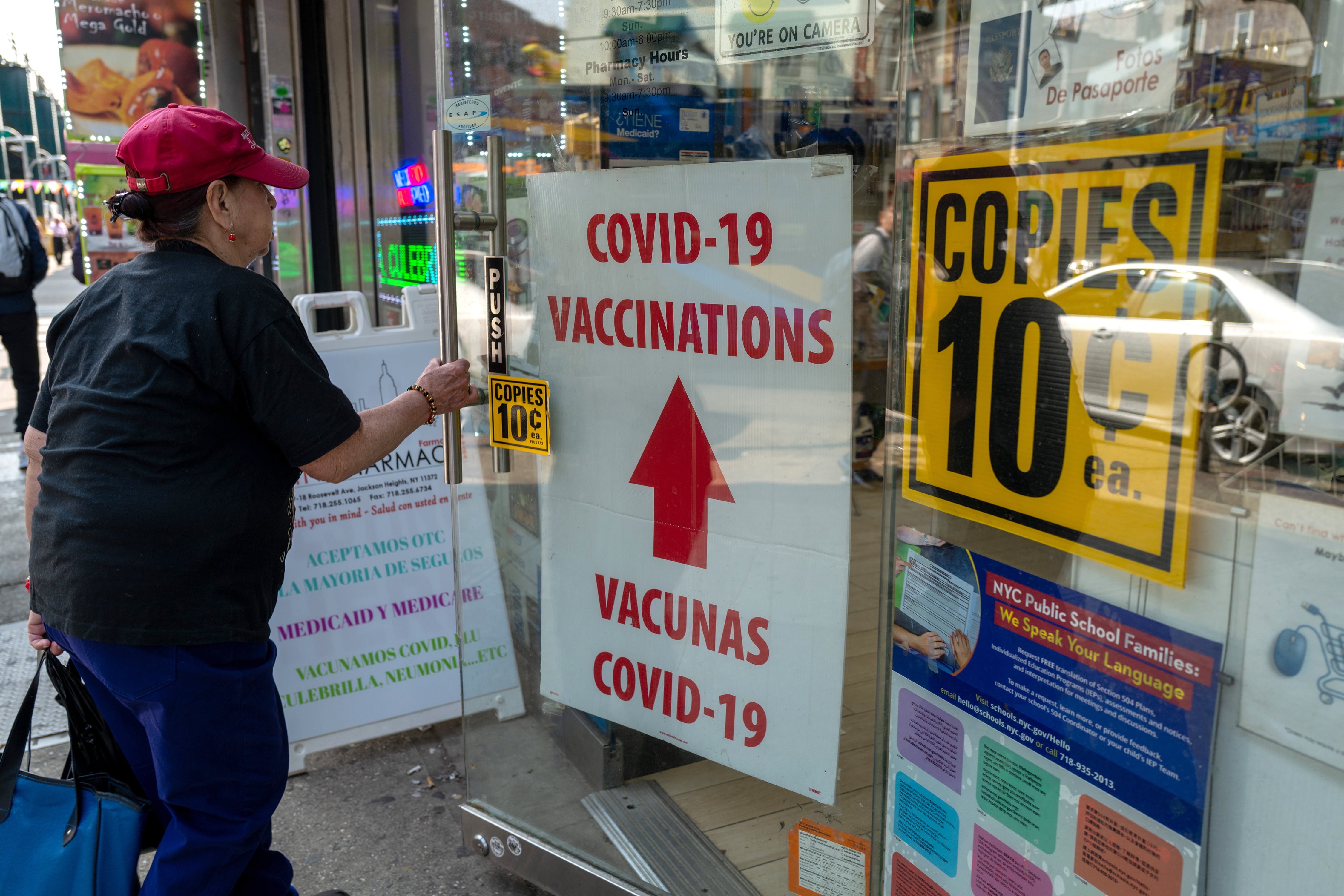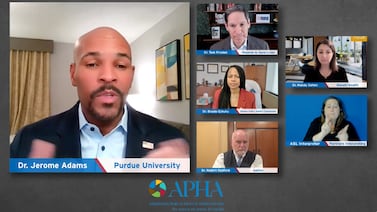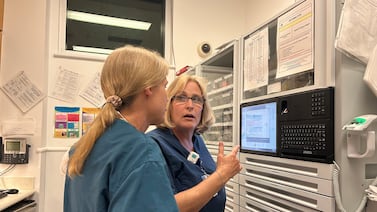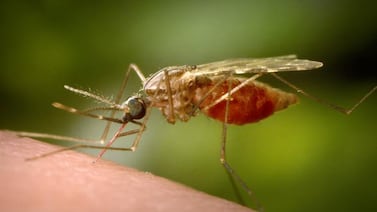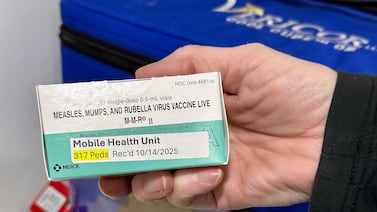Public health, explained: Sign up to receive Healthbeat’s free New York City newsletter here.
Covid-19 cases in New York City have trended upward this summer, as vaccine uptake remains low and testing and surveillance systems have been significantly scaled back.
Nationwide, Covid-19 test positivity rates have been rising since the spring, according to data from the Centers for Disease Control and Prevention. “FLiRT” variants — descendants of the JN.1 variant, which was dominant earlier this year — account for the vast majority of current Covid-19 cases across the country, according to CDC data.
The New York City Department of Health and Mental Hygiene reported an average of 888 Covid-19 cases per day in the week ending July 25. That’s a big jump from the weekly average of about 200 Covid-19 cases that the city recorded for much of the spring, though it’s still far lower than New York’s biggest Covid-19 surges. For the week ending July 25, the city reported an average of 36 hospitalizations per day and no deaths.
The NYS Wastewater Surveillance Network, which publishes wastewater data from participating counties statewide, showed “high” levels of Covid-19 detection in the sewage of the vast majority of New York City communities as of mid-July.
“We’re definitely seeing an uptick in the hospital at Mount Sinai,” Dr. Sean T. Liu, medical director of Mount Sinai’s COVID Clinical Trials Unit and an associate professor of medicine at the Icahn School of Medicine at Mount Sinai, said. “Personally, I know people who are getting it as well, so I do hear it in the community, and I see it in the hospital.”
What to do if you test positive
The Covid-19 cases Liu sees often include symptoms like a fever, a runny nose and a cough. Anyone who tests positive for Covid-19 should try to stay home from work, isolate from other people and mask, he said. The antiviral medication Paxlovid can also help, he said, noting that treatment is more effective the sooner it is started.
“Be mindful of others by taking care of yourself,” Liu said. “If you’re sick, try to isolate and try not to spread the virus, because it’s a very transmissible virus. Talk to your doctor — you might get Paxlovid. And get better soon.”
The CDC currently recommends resuming normal activities when, for at least 24 hours, you have not had a fever and your symptoms are improving overall. The CDC also encourages taking precautions for the next five days, including masking, physical distancing, air purification and testing.
“Cases are rising right now but we have the tools and experience to protect ourselves as well as one another,” Patrick Gallahue, a spokesperson for the Health Department, said in a statement.
He noted that New Yorkers can call the city’s Covid-19 hotline (212-COVID19) to connect with a NYC Health + Hospitals clinician who can prescribe antiviral medication.
Data has limitations
Even as Covid-19 continues to spread nationally and in New York, surveillance systems for tracking the virus have significantly diminished, said Dr. Bruce Y. Lee, a professor at the CUNY Graduate School of Public Health & Health Policy and executive director of Public Health Informatics, Computational, and Operations Research.
“Previously, we were relying on testing, and of course a lot of testing is now done at home, with these kits,” Lee said. “When people are positive, they don’t really report it to anyone, most of the time.”
Much of the city’s Covid-19 testing infrastructure has also faded, making free tests harder to come by. New York offers rapid and PCR testing at NYC Health + Hospitals facilities and community care clinics. But the Health Department’s network of free express testing sites, which offer fast PCR results, has almost entirely disappeared.
Large-scale programs to distribute free rapid tests have also dwindled. The federal government’s free Covid-19 test kit program ended in March. Rapid test kits are available for purchase at pharmacies, but private insurers are no longer required to cover their cost.
“The strategies that have beaten back COVID time and again continue to be available to us, though now as part of our routine health care system,” Gallahue said in a statement. “At-home tests are sold at pharmacies and online, and testing is offered by many pharmacies and providers.”
Covid-19 test-tracking operations have scaled back, too. The CDC halted its community-level tracking of Covid-19 when the public health emergency expired last year, and turned its focus to wastewater surveillance.
Yet wastewater data has its own limitations, Lee said, noting that it is a “very blunt and broad measurement” of the prevalence of Covid-19 in a community. Meanwhile, data on Covid-19 hospitalizations, emergency room visits and deaths, while precise, are all “after the fact,” he said.
Virus protection reduced
More than four years into the Covid-19 pandemic, vaccination rates are low and many mitigation measures have fallen by the wayside, enabling the virus to continue to spread.
“You’re seeing a lot fewer people wearing masks, you’re not seeing as much attention to air quality, like filtration and ventilation, and social distancing,” Lee said. “It’s largely nonexistent.”
Vaccination remains a key weapon in the fight against Covid-19, but nationwide uptake of last year’s booster was low. As of May, 22.5% of adults in the U.S. reported having received an updated 2023-24 Covid-19 vaccine, according to the CDC.
Lee noted that the protection the Covid-19 vaccine offers generally wanes after four to six months, meaning that people who were vaccinated last fall became vulnerable to the virus again this past spring.
Updated Covid-19 vaccines are expected to become available this fall, and the CDC recommends that everyone older than 6 months receives the shot.
The NYC Health Department stopped reporting new Covid-19 vaccination data last September. By that point, more than 90% of city residents had received at least one Covid-19 vaccine dose, but only 16% had received a bivalent vaccine dose, which became available in late 2022 to fight new variants.
Liu, who runs studies at Mount Sinai about long Covid — a range of often debilitating symptoms that can occur after a Covid-19 infection — noted that recent data indicate that vaccination can lower the risk of long Covid.
“People’s lives are really devastated by long Covid,” he said. “Long Covid is a real, terrible illness that if you can avoid at all costs, please do.”

